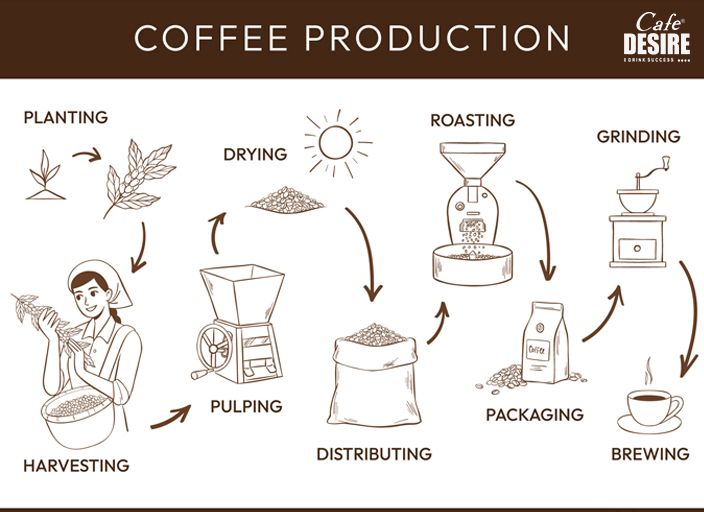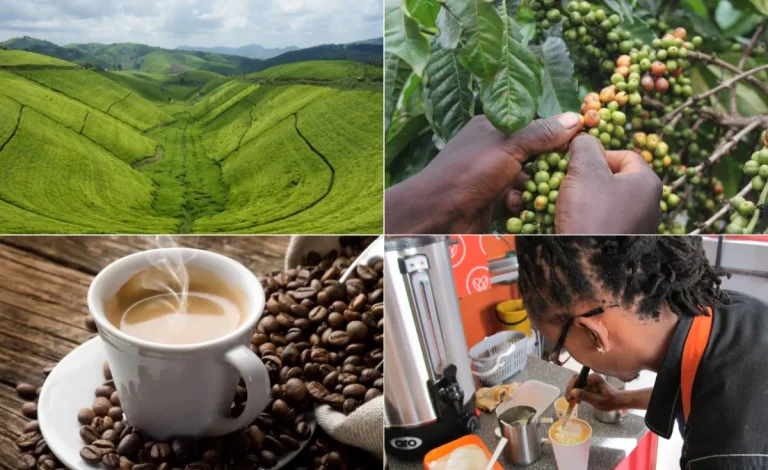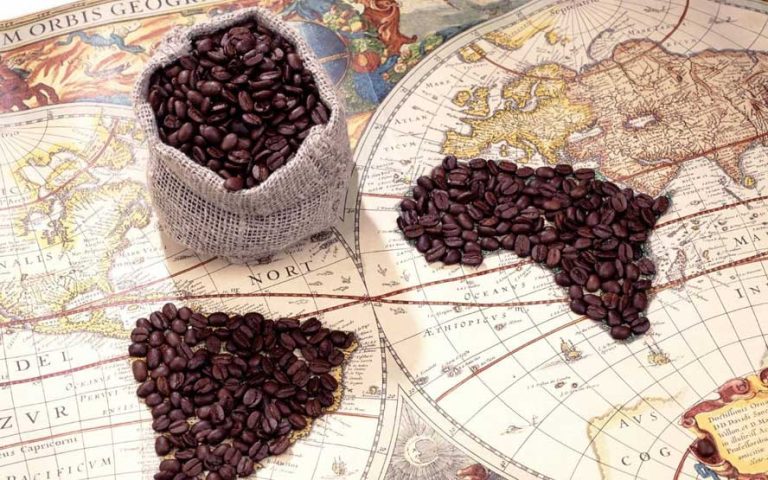Curious about the latest trends shaping the global coffee industry?
This article explores the diverse coffee cultures worldwide, from North America’s focus on craftsmanship and creativity to Africa’s emergence in specialty coffee.
Learn about unique brewing techniques like espresso, pour-over, and cold brew, and discover distinctive coffee offerings from Australia, Japan, and Turkey.
Explore the importance of sustainability in the coffee industry, including ethical sourcing and reducing environmental impact.
Join us on a journey through the world of coffee innovation and tradition.
Key Takeaways:
- The coffee industry is constantly evolving and adapting to global trends, with unique coffee offerings and brewing techniques emerging from different regions.
- Sustainability is a top priority in the coffee industry, with a focus on ethical sourcing, fair trade, and reducing environmental impact and waste.
- Espresso remains a central element in coffee culture, but pour-over and cold brew are gaining popularity for their precision and refreshing qualities. Supporting local roasters is a meaningful way to contribute to the dynamic and diverse coffee community.
Global Coffee Trends
Global Coffee Trends reflect the evolving preferences of customers in the coffee industry, providing insights into the anticipated shifts and innovations that may shape the market by 2023 and beyond.
North America: Craftsmanship and Creativity
In North America, Coffee Trends showcase a blend of craftsmanship and creativity, where artisanal brewing techniques and innovative flavors cater to the discerning tastes of customers.
From the bustling cafes of Seattle to the cozy corners of Montreal, a diverse range of coffee experiences awaits enthusiasts across the continent.
Artisanal coffee roasters source beans directly from sustainable farms, emphasizing quality and ethical production practices. These roasters take pride in offering unique blends, often experimenting with flavor profiles to create a memorable cup for their patrons.
The coffee culture in North America extends beyond just the brew itself. Cafes prioritize customer preferences, offering customization options, such as alternative milk choices and various brewing methods like pour-over, siphon, and cold brew. This personalized approach ensures that every customer finds their perfect cup of coffee that suits their taste and style.
Europe: A Blend of Tradition and Innovation
Europe’s Coffee Trends harmonize tradition and innovation, where a diverse blend of brewing methods and flavors captivate customers seeking a unique coffee experience rooted in rich cultural heritage.
The coffee culture across Europe reflects a deep appreciation for distinct blends that pay homage to the regions’ historical significance and local ingredients. From the classic Italian espresso to the artful pour-over techniques in Scandinavian cafes, coffee enthusiasts are embracing a variety of brewing styles to savor each cup’s intricate flavors. These unique blends not only offer a sensory journey but also serve as a way to connect with the diverse cultural heritage of each country.
Asia: East Meets West in Coffee Culture
Asia’s Coffee Trends epitomize the convergence of East and West influences, where a harmonious blend of brewing techniques and flavors caters to the diverse palates of customers embracing a global coffee culture.
This fusion of traditional Asian coffee rituals with modern Western coffee trends has given rise to unique concoctions that offer an exciting sensory experience. From aromatic Vietnamese egg coffee to the creamy Malaysian white coffee and the bold Indonesian Kopi Tubruk, the diversity of flavors in Asian coffee is truly unparalleled.
The innovative brewing methods such as pour-over, siphon brewing, and nitro-infused coffee have become increasingly popular, redefining the coffee experience in the region.
South America: The Heart of Coffee Production
South America stands as the Heart of Coffee Production, where rich brewing traditions, superior quality beans, and a deep connection to the land yield exceptional coffee experiences that captivate customers worldwide.
Known for its diverse coffee landscapes and microclimates, South America is a melting pot of flavors and aromas that shape the coffee industry. Countries like Colombia, Brazil, and Peru are renowned for their distinctive coffee profiles, blending floral, fruity, and chocolatey notes that cater to a wide range of palates.
The commitment to sustainable practices in South American coffee production plays a crucial role in upholding quality standards. From shade-grown crops to organic farming methods, the region prioritizes eco-friendly approaches that not only preserve the environment but also enhance the flavors of the beans.
Africa: A Rising Star in Specialty Coffee
Africa emerges as a Rising Star in Specialty Coffee, where unique flavor profiles, immersive coffee experiences, and a focus on sustainability enchant customers seeking distinctive and ethically sourced brews.
The African coffee scene has transformed into a vibrant tapestry of flavors and traditions. Each region, from the highlands of Ethiopia to the lush plantations of Rwanda, offers a diverse range of coffee profiles, reflecting the terroir and dedication of local farmers. Customers are drawn to the authenticity and uniqueness of these coffee offerings, with their nuanced notes of fruit, floral aromas, and hints of spice.
Moreover, sustainability lies at the heart of African coffee culture, with many producers embracing eco-friendly practices and fair trade initiatives. This commitment to ethical sourcing resonates with consumers who prioritize transparency and social responsibility in their coffee choices.
Coffee Brewing Techniques
Coffee Brewing Techniques encompass a spectrum of methods including the classic espresso, the meticulous pour-over, and the refreshing cold brew, each offering a distinct approach to extracting flavors and aromas from coffee beans.
Espresso: The Backbone of Classic Coffee Drinks
Espresso reigns as the Backbone of Classic Coffee Drinks, renowned for its rich flavor, intense aroma, and versatility in creating a wide range of beloved coffee beverages cherished by customers worldwide.
Espresso brewing is an intricate process that involves forcing hot water through finely-ground coffee beans, resulting in a concentrated and bold flavor profile that appeals to coffee connoisseurs and casual drinkers alike. The unique blend of bitterness and sweetness in espresso forms the basis for iconic drinks like cappuccinos, lattes, and macchiatos, each with its own delicate balance of espresso, steamed milk, and foam.
Espresso’s significance in coffee culture extends beyond its taste; it embodies the essence of Italian coffee tradition and influences global coffee trends. Understanding the diverse preferences of customers, from those who seek the intense kick of a straight espresso shot to others who prefer the creamy indulgence of a well-crafted latte, underscores the significance of espresso in shaping modern coffee experiences.
Pour-Over: Precision and Control
Pour-Over coffee delights aficionados with its Precision and Control, offering a hands-on brewing experience that accentuates the nuanced flavors of carefully selected artisanal blends, catering to the discerning tastes of customers seeking a bespoke coffee journey.
Embracing the pour-over technique is like engaging in a delicate dance between art and science. The meticulous pouring of hot water over freshly ground coffee grounds requires patience and skill, resulting in a brew that epitomizes craftsmanship. The marriage of water temperature, grind size, and brew time is crucial in achieving the desired flavor clarity that defines specialty coffee.
Enthusiasts favor pour-over not just for the output, but for the ritualistic process that unfolds—a sensory experience that goes beyond mere coffee consumption. The ever-evolving landscape of artisanal blends caters to diverse palates, from fruity and floral notes to rich, chocolatey undertones, allowing for a personalized coffee adventure with each sip.
Cold Brew: A Refreshing Alternative
Cold Brew emerges as a refreshing alternative in the coffee scene, offering a smooth and mellow flavor profile achieved through a slow brewing process that captures the essence of coffee beans in a refreshing and invigorating cup.
This unique brewing technique involves steeping coarsely ground coffee in cold water for an extended period, usually around 12-24 hours. The result is a coffee concentrate that is then diluted with water or milk to create a perfectly balanced drink.
The flavor characteristics of cold brew are distinct, with low acidity and bitterness, making it a favorite among those who prefer a less intense coffee experience. Its subtle sweetness and undertones of cocoa or caramel add depth to the overall taste.
Unique Coffee Offerings Worldwide
Unique Coffee Offerings Worldwide showcase diverse coffee cultures, from Australia’s Flat White phenomenon to Japan’s Kyoto-Style Cold Brew and Turkey’s Traditional Turkish Coffee, each presenting a rich tapestry of flavors and traditions that captivate coffee enthusiasts globally.
Australia: The Flat White Phenomenon
Australia’s Flat White Phenomenon celebrates a harmonious blend of velvety microfoam and rich espresso, crafting a smooth and indulgent coffee experience that has garnered a loyal following among customers seeking a balance of flavor and texture in their daily brew.
This renowned coffee creation is a staple in Australian coffee culture, known for its meticulous preparation involving the careful steaming of milk to create a silky microfoam that is seamlessly poured over a double shot of espresso. The artistry behind achieving the perfect microfoam texture is crucial to the Flat White’s appeal, as it enhances the coffee’s overall mouthfeel and complements the bold flavors of the espresso.
One of the defining characteristics of a Flat White is its minimalistic approach to presentation and flavor, emphasizing the quality of the coffee itself rather than excessive embellishments or syrups. This simplicity has resonated with coffee enthusiasts worldwide, drawing them to appreciate the subtle nuances of the beverage’s flavor profile.
Japan: Kyoto-Style Cold Brew
Japan’s Kyoto-Style Cold Brew captivates coffee enthusiasts with its meticulous brewing process that yields a smooth and subtly sweet flavor profile, embodying the artful balance of patience and precision to deliver a refreshing coffee experience cherished by customers embracing Japanese coffee traditions.
The intricate brewing method of Kyoto-Style Cold Brew involves a slow drip process that can take several hours to produce a single batch of this chilled coffee delight. This technique allows the coffee to extract delicate flavors from the beans while maintaining a clean and crisp finish, enhancing the overall drinking experience.
Japanese coffee culture places great emphasis on attention to detail and quality, which is exemplified in the way Kyoto-Style Cold Brew is crafted. Each drop of this cold brew reflects the dedication of the brewers to create a beverage that is not just a drink but a harmonious blend of flavors harmonizing to please the palate.
Turkey: Traditional Turkish Coffee
Turkey’s Traditional Turkish Coffee embodies centuries-old rituals and a rich cultural heritage, offering customers a bold and aromatic coffee experience steeped in tradition and elegance, creating a sensory journey through the essence of Turkish coffee culture.
From the moment the finely ground coffee beans are carefully mixed with water and sugar in a traditional cezve, to the slow and deliberate brewing process on low heat, each step in preparing Turkish coffee is a celebration of time-honored customs and meticulous attention to detail. The moment the rich aroma begins to waft through the air, it signals the beginning of a sensory experience that transcends mere consumption, connecting drinkers to the artistry and history behind each cup.
Sustainability in Coffee Industry
Sustainability in the Coffee Industry focuses on ethical sourcing practices, minimizing environmental impact, and reducing waste to foster a more sustainable and responsible coffee ecosystem that prioritizes the well-being of communities and the planet.
Ethical Sourcing and Fair Trade
Ethical Sourcing and Fair Trade initiatives in the coffee industry prioritize transparency, equity, and quality, ensuring that coffee producers receive fair compensation while promoting sustainable practices that benefit both communities and consumers.
Fair trade certification plays a crucial role in this process, guaranteeing that strict standards are met regarding labor conditions, environmental impact, and social responsibility. By adhering to these certifications, coffee companies demonstrate their commitment to ethical business practices and respect for human rights.
Sustainable sourcing practices not only safeguard the environment by reducing waste and carbon footprint but also foster long-term relationships with farmers, leading to improved product quality and consistency.
Environmental Impact and Reducing Waste
Addressing Environmental Impact and Reducing Waste in the coffee industry involves innovative solutions to minimize carbon footprint, promote recyclability, and implement sustainable practices that mitigate waste generation, fostering a greener and more eco-conscious coffee ecosystem.
In recent years, the coffee industry has witnessed a surge in waste management efforts, with many companies adopting advanced technologies and sustainable strategies to address environmental concerns. One key focus area has been on developing biodegradable packaging materials and eco-friendly brewing methods to reduce the carbon footprint associated with coffee production. Initiatives such as establishing partnerships with local farmers to encourage sustainable farming practices have proven to be instrumental in creating a more sustainable coffee supply chain. By embracing sustainable solutions and waste reduction initiatives, coffee producers are not only enhancing their environmental stewardship but also fostering a more resilient and environmentally conscious industry for the future.
Summary
In Summary, the evolving Coffee Trends reflect a global shift towards sustainability, innovation, and customer-centric approaches, reshaping the coffee industry landscape and fostering a more diverse and environmentally conscious coffee culture worldwide.
The increasing focus on sustainable practices has urged coffee producers, big and small, to adopt environmentally friendly techniques such as shade-grown coffee, rainforest preservation, and fair-trade agreements.
- Climate change resilience strategies, including crop diversification and water conservation efforts, have become paramount in ensuring the long-term viability of coffee farming amid changing weather patterns.
- Emerging technologies like blockchain traceability and precision agriculture are revolutionizing how coffee supply chains operate, promoting transparency and accountability from farm to cup.
Frequently Asked Questions
The Frequently Asked Questions section addresses common queries related to coffee culture, the role of espresso, and the significance of supporting local roasters, offering insights into key aspects of the evolving coffee landscape and consumer preferences.
Role of Espresso in Coffee Culture
The Role of Espresso in Coffee Culture is multifaceted, serving as the foundation for a myriad of classic coffee beverages while embodying the essence of precision and flavor that resonates with customers worldwide.
Within the realm of coffee traditions, espresso holds a special place. Its origins can be traced back to Italy in the late 19th century, where it quickly became synonymous with the bustling cafe culture of Europe. The brewing techniques involved in preparing espresso are precise and nuanced, requiring a skilled barista to carefully extract the rich, concentrated flavors from finely ground coffee beans.
Espresso brewing is a delicate art that involves high pressure and a short brewing time, resulting in a distinctive beverage with a velvety crema.
This method of brewing not only creates a unique flavor profile but also captures the essence of coffee in its purest form. For customers, the allure of espresso lies in its bold flavor, intense aroma, and the versatility to be enjoyed on its own or as the base for a variety of beloved coffee creations.
Significance of Supporting Local Roasters
The Significance of Supporting Local Roasters lies in fostering community engagement, promoting quality-driven coffee experiences, and advancing sustainable practices that contribute to a vibrant and diverse coffee market embraced by discerning consumers.
Backing local coffee roasters strengthens the sense of community by creating spaces for social interaction and supporting local economies. When you choose to support local roasters, you not only get access to high-quality coffee but also help the sustainability efforts within the industry.
By prioritizing local roasters, you encourage innovation and ensure that market dynamics remain diverse and dynamic, catering to different tastes and preferences. This approach leads to a more personalized experience for coffee enthusiasts and a deeper connection to the coffee-making process.
Further Reading
For those eager to delve deeper into the world of coffee, the Further Reading section offers a curated selection of articles, guides, and resources to explore various coffee cultures, brewing techniques, and industry insights.
If you are passionate about coffee exploration, you’ll find a wealth of educational content that delves into the intricacies of different coffee origins, roasting processes, and flavor profiles. These resources not only offer guidance on perfecting your home brewing methods but also keep you updated on the latest industry developments and trends.
Whether you are looking to master the art of making espresso or understand the nuances of pour-over brewing, there are comprehensive guides available to enhance your coffee knowledge. Dive into the world of coffee with recommended readings that cover everything from bean selection to latte art techniques.
Frequently Asked Questions
What are the current trends in the coffee industry?
The current trends in the coffee industry include an increased focus on sustainability and ethical sourcing, the rise of specialty and artisanal coffee, and the growing popularity of alternative brewing methods such as cold brew and pour over.
What innovations are shaping the future of coffee?
Innovations such as smart coffee machines, coffee subscription services, and coffee-infused food and beverage products are shaping the future of coffee. There is also a growing trend towards incorporating technology and data analysis in the coffee industry to improve the overall coffee experience.
How will climate change impact the future of coffee?
Climate change is a major concern for the coffee industry as it affects the growth and production of coffee beans. It is predicted to lead to changes in crop yields and quality, which could impact the availability and price of coffee in the future.
What role does consumer demand play in shaping the coffee industry?
Consumer demand is a driving force in the coffee industry, influencing trends, innovations, and pricing. As consumers become more conscious about their coffee choices, their demands for sustainability, transparency, and quality will continue to shape the industry.
What are some emerging coffee trends on the horizon?
Some emerging coffee trends on the horizon include the use of blockchain technology for tracking coffee supply chains, the rise of functional and wellness-focused coffee products, and the incorporation of artificial intelligence in coffee production and distribution.
How will the future of coffee impact coffee farmers and producers?
The future of coffee will have a significant impact on coffee farmers and producers, as they will need to adapt to changing climate conditions and consumer demands. There is also a growing emphasis on supporting fair wages and working conditions for coffee farmers to ensure the sustainability of the industry.






